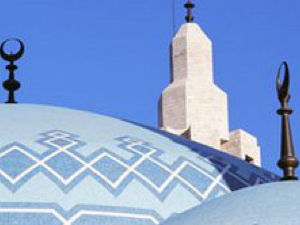
Edit OmarKN
-
Commendation By The Great Scholar Of Morocco,
The Diligent Hadith Scholar,
Prof. `Abdullah Guenon Al-Hasani,
President Of The Moroccan League Of Scholars
And Member Of The Islamic World League, Mecca

“They err in their understanding of the reality of intermediaries, and recklessly rush to the judgement that any intermediary is shirk ...”
From: Notions That Must Be Corrected
Shaykh Muhammad b. `Alawi al-Maliki al-Hasani, p.53ff
As we said, those who used figurative explanation did so out of a desire to protect the laity from erring in their understanding of allegorical phrases.
For this reason, there were few of them who returned in the end to simply leaving the matter to Allah (tafwīd), so much so, that one of them used to say: "O Allah, grant us faith like the faith of old women!"
The important thing is that they are all Ahl al-Sunna wa al-Jamā`a, believers in all that came to them from Allah and His noble Messenger, as He ordered - so how could they be accused of being disbelievers or heretics?
It is nothing but bigotry and small-mindedness, if not political. Indeed, in Morocco, when al-Mahdī b. Toumart returned from his travels seeking knowledge in the East, meeting many great Ash’ari scholars like al-Kiyā al-Harrāsī, he proceeded to disseminate the school throughout Morocco. When he claimed to be the Mahdi, and established the Almohad state, he obliged the population to adhere to the school, and fought against the school of the early Muslims, dismissing the previous Almoravid state as "anthropomorphists", when they actually were upon the way of the early Muslims in their beliefs. He called his own dynasty Muwahhidūn ("Monotheists"). He also opposed the Maliki school and the scholars of Morocco and Andalusia who adhered to it. In this way, enmity developed between the two groups; and the inherent cause was political.
What has been said about this issue, which the first section of the book handles, can also be said about the issue of the celebration of the Prophet’s ( sallAllahu `aleihi wa sallam ) birthday in the second section, and the issue of visitation in the third.
Although people did not celebrate the Prophet’s ( sallAllahu `aleihi wa sallam ) birthday in the past, there are many things that we do that they did not, and al-Faruq (’Umar رضي الله عنه ) did not accept this argument from al-Siddīq (Abu Bakr رضي الله عنه ) when he bade him compile the Qur’an, and Abu Bakr eventually changed his mind, and compiled it.
The like of this occurred when ’Umar b. ’Abd al-’Aziz ordered the scholars of the Muslims world to write down the Hadith reports. In the past, they had abstained from doing so, but they acquiesced to him, none of them saying: "Would you do that which the earlier generations did not?" The same thing can be said for the adding of diacritics to the written text of the Qur’an, and the development of prayer niches in the mosques and the building of minarets, until it reached the point where no mosque was built…
صلّى الله على سيّدنا محمّد و على آله و صحبه و سلّم
The blessings and peace of Allah on the Prophet, his Family, and his Companions, ( sallAllahu `aleihi wa sallam ) .


Related texts
![]() The Intermediary of Shirk
The Intermediary of Shirk
Notions That Must Be Corrected; Shaykh Muhammad b. `Alawi al-Maliki al-Hasani
[download book]